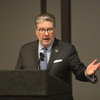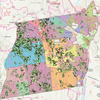Study: Belief in vaccine misinformation linked to vaccine resistance
ALBANY COUNTY — A survey across all 50 states, meant to gauge what misinformation on COVID-19 vaccines Americans believe, has shown that more than half — 51 percent — said they were not sure about the veracity of at least one of four false statements.
The report, released on Aug. 9, came from researchers at Northeastern, Harvard, Rutgers, and Northwestern universities working together as part of the Consortium for Understanding the Public’s Policy Preferences Across States.
It comes as the highly contagious Delta variant of COVID-19 is now dominant in the United States, raising infection, hospitalization, and death rates — making the need for vaccination more urgent.
As of Friday, according to the state’s vaccine tracker, 58.1 percent of New Yorkers are fully vaccinated against COVID-19 and 62.5 percent of Albany County residents are.
On Friday morning, Albany County Executive Daniel McCoy reported 51 new cases of COVID-19, making 351 active cases in the county, up from 335. He also reported 696 county residents under quarantine, up from 651, and three new hospitalizations since Thursday; 21 county residents are now hospitalized with the virus – a net increase of three with four patients still in intensive-care units,
The consortium’s online survey, with state-level representations of quotas for race-ethnicity, age, and gender, included four statements for which respondents could mark “true,” “false,” or “not sure”:
— The COVID-19 vaccines will alter people’s DNA;
— The COVID-19 vaccines contain microchips that could track people;
— The COVID-19 vaccines contain the lung tissue of aborted fetuses; and
— The COVID-19 vaccines can cause infertility, making it more difficult to get pregnant.
“While all four claims have been debunked,” the researchers write, “close to one in ten Americans believe each individual statement to be true. Specifically, 8% of our respondents think that vaccines may allow you to be microchipped, 9% say vaccines use aborted fetal cells, 10% believe vaccines can alter human DNA, and 11% are concerned that vaccines can cause infertility.”
The report goes on, “While a relatively small percent of respondents report that they believe each statement, there is a considerable proportion (ranging from 22% for microchips to 37% for infertility) who say they are not sure whether the misinformation items are true. The most prevalent misperception in our data links the COVID-19 vaccines to infertility. It is a clear cause for concern that only about half (52%) of our respondents were able to identify this particular statement as false.”
The authors conclude that belief in vaccine misinformation as well as uncertainty about misinformation is associated with lower vaccination rates and higher vaccine resistance.
The study was spurred by President Joe Biden’s claims in July that social media platforms were “killing people” by facilitating the spread of vaccine misinformation. Not long after, Senate Republican leader Mitch McConnell similarly declared that misinformation was to be blamed for the low vaccination rates of Americans.
“The public debate that followed brought to the forefront a series of important questions,” the authors write, listing them: “How prevalent is the public’s belief in vaccine misinformation? Is that belief associated with vaccine resistance? Are some social groups more susceptible to it than others? Are social media companies responsible for the higher levels of vaccine resistance among some of their users?”
The authors had access to a Twitter panel of 1.6 million accounts matched to demographic information. From November 2020 to July 2021, they collected over 3.8 million tweets about COVID-19 vaccines. Of those, about 55,000, or close to 1.5 percent, included key terms potentially linking them to one of the four misinformation items.
Among the four misinformation items, the idea that vaccines contain microchips was most mentioned on Twitter, though its popularity decreased over time, the researchers found; the second most popular false claim, which connected vaccines to infertility, increased in prevalence after November 2020.
The researchers believe that vaccine misinformation and lower vaccination rates are “at least connected.”
Among people who did not believe any misinformation items, 70 percent reported being vaccinated, and 15 percent were vaccine resistant. In the group that thought multiple statements were true, 46 percent were vaccinated, and a staggering 42 percent were vaccine resistant.
Among respondents who identified all four misinformation claims as false, only 5 percent were vaccine resistant, and 85 percent were vaccinated.
The researchers note this consistent pattern: “COVID-19 misperceptions and uncertainty seem to be linked to vaccination status.”
The authors then ask: All else being equal, are those of us who eschew misinformation more likely to be vaccinated?
To answer this question, they produced models that account for demographics, geography, political party, news consumption, trust in the government, trust in science, and personal experience with COVID-19.
“Even when all of those factors are taken into consideration,” they write, “both belief in false vaccine claims and uncertainty about those claims were significantly linked to vaccination attitudes ….
“Knowing that misinformation is consistently linked to negative vaccination outcomes, we also examine the differences in misperception levels across social groups.”
The researchers found that women — 18 percent of whom believe at least one false item — are 4 percentage points less likely to hold misperceptions compared to men, at 22 percent. Women, however, are 8 percentage points more likely to report uncertainty instead of marking all misinformation claims as false.
In terms of race, Asian Americans are least likely to believe a false claim (16 percent do), compared to African American (21 percent), Hispanic (20 percent), and white (20 percent) respondents.
The largest gaps among demographic categories emerged for age groups. Only 9 percent of those 65 and older reported believing any of the false claims, followed by 17 percent of people aged 45 to 64, and 22 percent of those between 18 and 24.
Those in the 25-to-44 age bracket were most likely to report believing misinformation, with 29 percent saying that at least one false claim was accurate — a 20 percentage-point gap with the 65-plus group.
Americans with the lowest and highest socioeconomic status were more likely to be misinformed compared to those in the middle. “In the case of highly educated respondents,” the authors state, “this pattern is at least partly due to the fact that graduate degree holders are especially likely to select a definitive answer and avoid admitting that they did not know the correct response.”
The researchers also documented political differences, with 25 percent of Republicans holding misperceptions compared to 17 to 19 percent among other groups. Democrats were most likely to mark all misinformation items as false — 48 percent did so — which put them 12 to 21 percentage points ahead of other groups.



